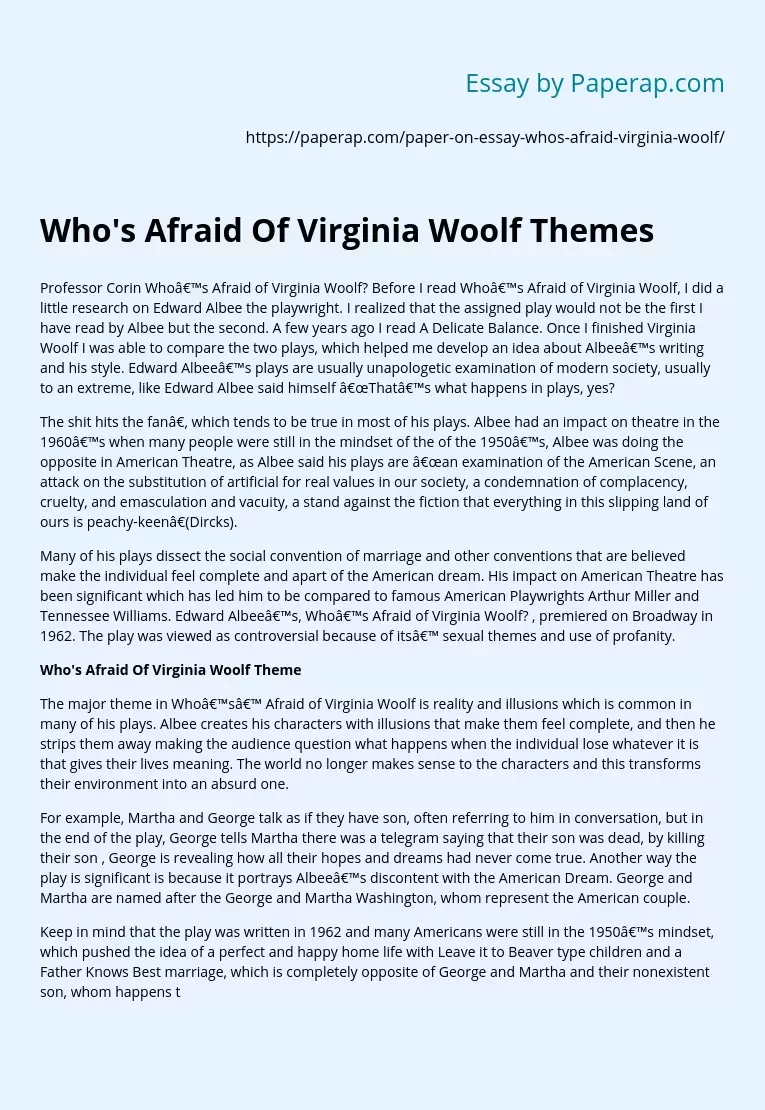Who's Afraid Of Virginia Woolf Themes
Professor Corin Who’s Afraid of Virginia Woolf? Before I read Who’s Afraid of Virginia Woolf, I did a little research on Edward Albee the playwright. I realized that the assigned play would not be the first I have read by Albee but the second. A few years ago I read A Delicate Balance. Once I finished Virginia Woolf I was able to compare the two plays, which helped me develop an idea about Albee’s writing and his style.
Edward Albee’s plays are usually unapologetic examination of modern society, usually to an extreme, like Edward Albee said himself “That’s what happens in plays, yes?
The shit hits the fan”, which tends to be true in most of his plays. Albee had an impact on theatre in the 1960’s when many people were still in the mindset of the of the 1950’s, Albee was doing the opposite in American Theatre, as Albee said his plays are “an examination of the American Scene, an attack on the substitution of artificial for real values in our society, a condemnation of complacency, cruelty, and emasculation and vacuity, a stand against the fiction that everything in this slipping land of ours is peachy-keen”(Dircks).
Many of his plays dissect the social convention of marriage and other conventions that are believed make the individual feel complete and apart of the American dream. His impact on American Theatre has been significant which has led him to be compared to famous American Playwrights Arthur Miller and Tennessee Williams.
Edward Albee’s, Who’s Afraid of Virginia Woolf? , premiered on Broadway in 1962. The play was viewed as controversial because of its’ sexual themes and use of profanity.
Who’s Afraid Of Virginia Woolf Theme
The major theme in Who’s’ Afraid of Virginia Woolf is reality and illusions which is common in many of his plays. Albee creates his characters with illusions that make them feel complete, and then he strips them away making the audience question what happens when the individual lose whatever it is that gives their lives meaning. The world no longer makes sense to the characters and this transforms their environment into an absurd one.
For example, Martha and George talk as if they have son, often referring to him in conversation, but in the end of the play, George tells Martha there was a telegram saying that their son was dead, by killing their son , George is revealing how all their hopes and dreams had never come true. Another way the play is significant is because it portrays Albee’s discontent with the American Dream. George and Martha are named after the George and Martha Washington, whom represent the American couple.
Keep in mind that the play was written in 1962 and many Americans were still in the 1950’s mindset, which pushed the idea of a perfect and happy home life with Leave it to Beaver type children and a Father Knows Best marriage, which is completely opposite of George and Martha and their nonexistent son, whom happens to be the only common dream they share. Albee is commenting on the American Dream and perhaps saying that behind these perfect 1950 marriages there are probably a lot of couples who would love to get a divorce if only it was socially acceptable.
It’s not only Martha and George that represent the American Dream but so do Nick and Honey, the couple that is invited over by Martha, at first they appear as a fresh and attractive couple who seem to be quite opposite of Martha and George, but eventually we realize that they could easily be traveling down the same road as Martha and George had, which landed them in a miserable marriage. Once again Albee has destroyed the idea of the American Dream. I believe what was so significant about Whos’ Afraid of Virginia Woolf? is how progressive the themes were. Theatre was still stuck in the 1950’s and Albee’s play was moving theatre forward to a progressive era, where social conventions were challenged. Before I had seen the movie and the play which were great. Of all three forms of media, nothing can compare to the initial awkwardness that develops between the actors and the audience within the first few minutes of the play, of course this would not have been possible if it was not for the personal and blunt dialogue of the characters that Albee created.
The story also enforced my own personal views on marriage and helped me develop my own ideas of what should be considered the American dream. I also enjoyed the mood of the play which was dark, bitter and usually humorous at another characters expense. So overall, yes, I absolutely enjoyed reading this play and if given the opportunity I would definitely see it again on stage! Works Cited Dircks, Phyllis T. Edward Albee: a Literary Companion. Jefferson, NC: McFarland &, 2010. 151-53. Print.
Who's Afraid Of Virginia Woolf Themes. (2019, Dec 05). Retrieved from https://paperap.com/paper-on-essay-whos-afraid-virginia-woolf/

